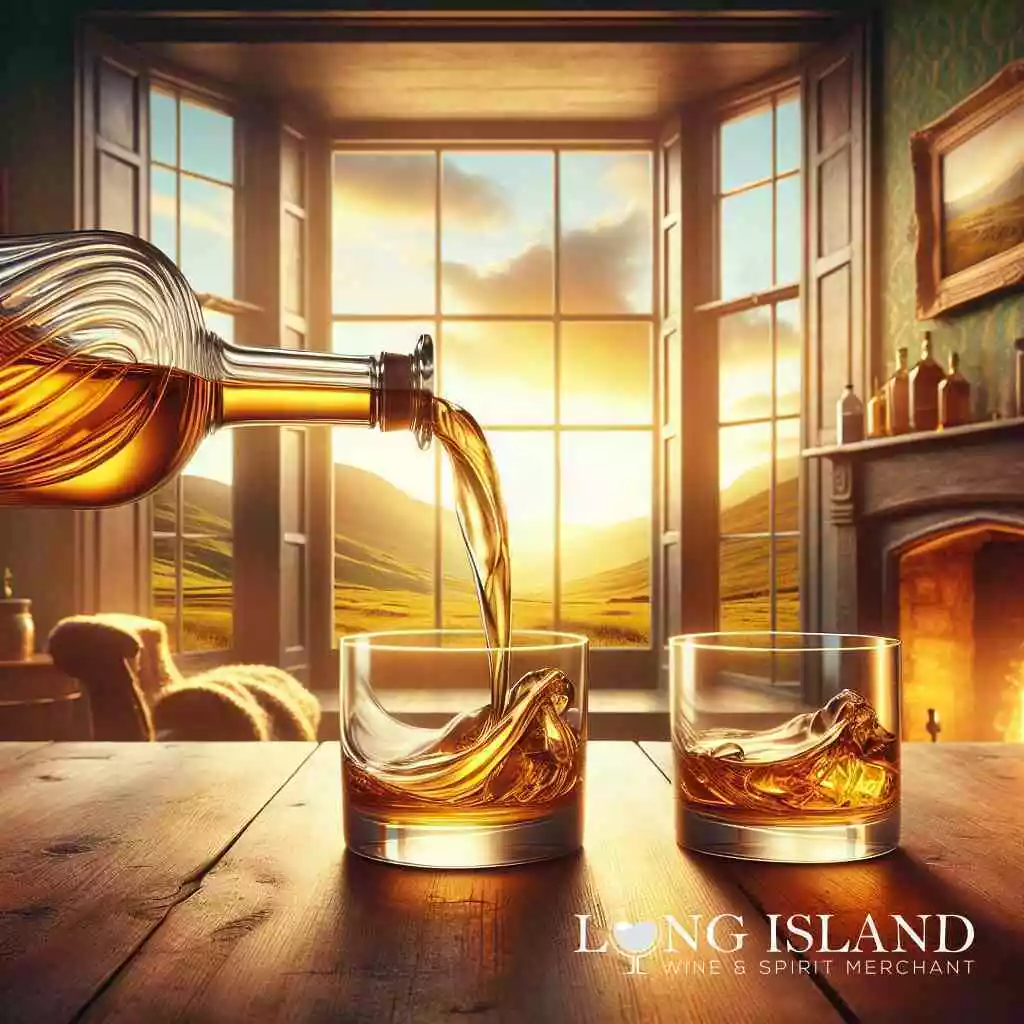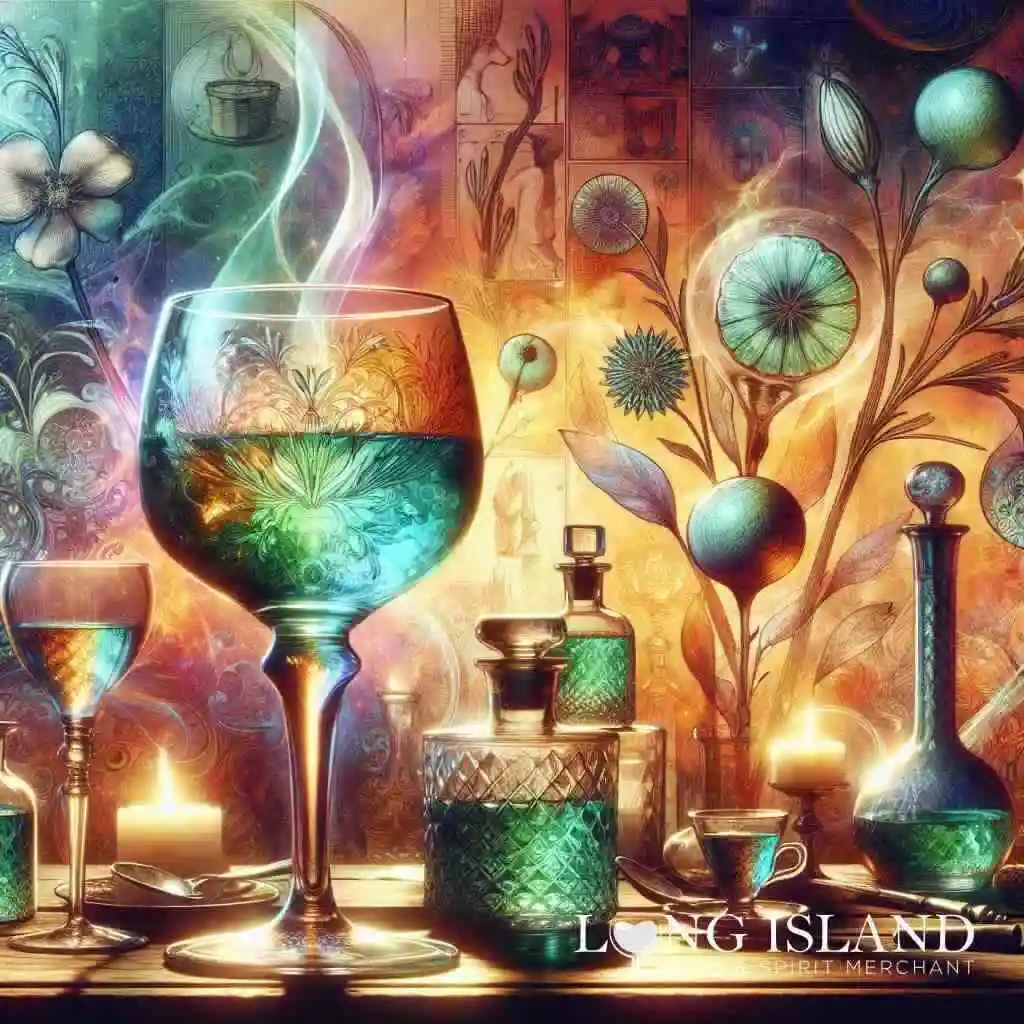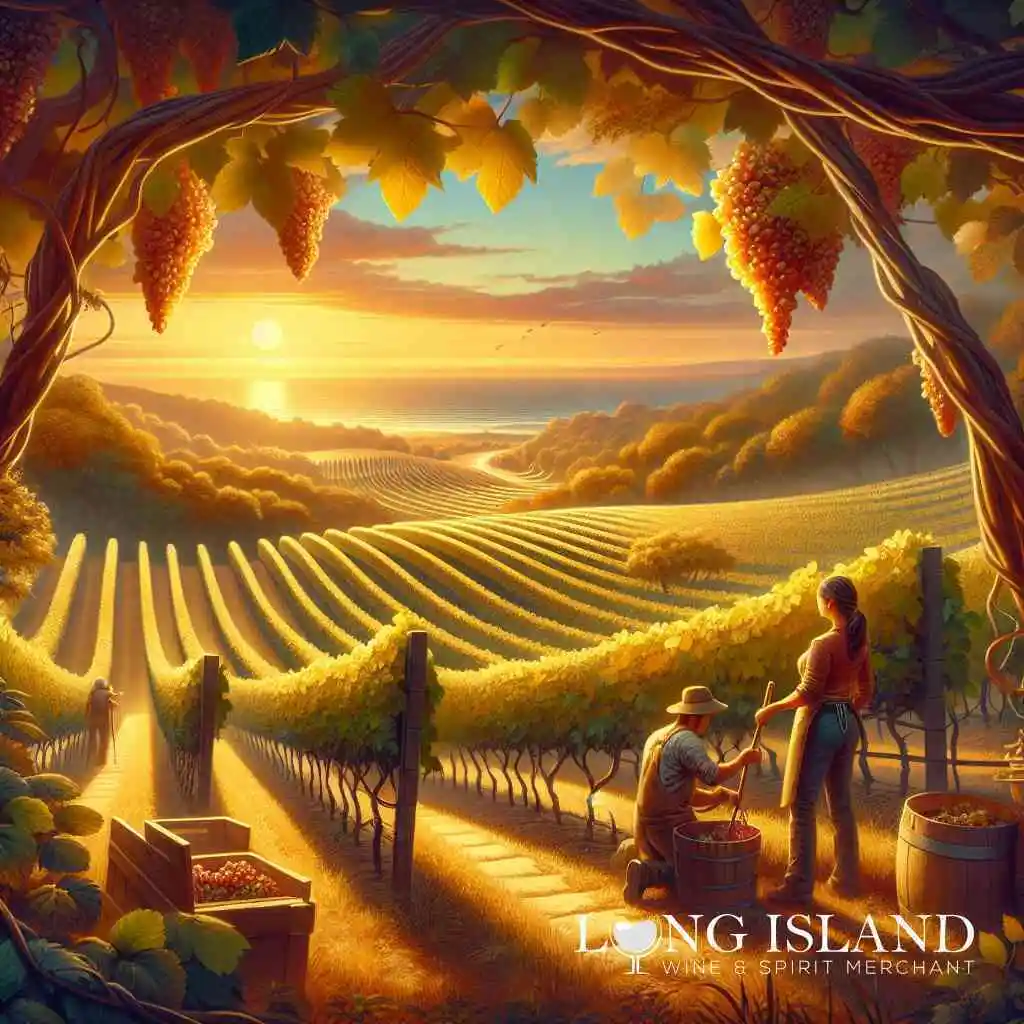
The Difference Between Irish Whiskey and Scotch
August 28, 2024
Introduction
Understanding Whiskey
Whiskey, one of the world’s oldest distilled spirits, has a history as complex and nuanced as its flavor. With origins tracing back to the ancient Celtic traditions of Ireland and Scotland, whiskey has been a beloved beverage for centuries, crafted lovingly by distillers who have passed down their unmatched skills and closely guarded secrets through generations. At its core, whiskey is a distilled alcoholic beverage made from fermented grain mash, a simple definition that belies the intricate processes and diverse ingredients that contribute to its myriad of variations. Grains such as barley, corn, rye, and wheat are selected for fermentation, a choice that heavily influences the spirit’s ultimate flavor profile.
Irish Whiskey vs Scotch: A Tale of Two Distillations
Irish whiskey and Scotch whisky (note the spelling difference) are two of the most famous and distinguishable variations of this spirit, each with its own rich tradition, production methods, and flavors. The primary distinction begins with geography; Irish whiskey is crafted in Ireland, while Scotch whisky calls Scotland its home. Beyond location, significant differences in distillation processes, ingredients, and aging contribute to their unique characteristics. Irish whiskey typically undergoes triple distillation, a method that ensures a smoother, lighter spirit, and predominantly uses unmalted barley. On the other hand, Scotch whisky is usually distilled twice and often uses malted barley, which, when combined with Scotland’s unique use of peat in the malting process, imbues Scotch with a distinct smokiness absent in many Irish whiskeys.
Order Alcohol Online’s Journey through Whiskey
Embarking on a journey through the world of whiskey with Order Alcohol Online offers enthusiasts a seamless and enriching experience. Through our comprehensive offerings, including ordering Irish whiskey online and the chance to Purchase Scotch whisky in-store, connoisseurs and novices alike can explore the nuanced differences and rich histories of these iconic spirits. Our dedication to providing a broad selection extends beyond just whiskey, encompassing everything from white wine and red wine to exotic spirits, ensuring that every sip you take is an adventure in taste, craftsmanship, and tradition.
Origins and History
The Roots of Irish Whiskey
Irish whiskey’s history is deeply entrenched in the lush landscapes and rich cultural narratives of Ireland. Dating back over a thousand years, it is considered one of the earliest distilled beverages in Europe. The craft of whiskey distillation was possibly brought to Ireland by traveling monks, who had no idea they were laying the groundwork for a national legacy. Unlike many other spirits, the production of Irish whiskey remained a predominantly rural craft for centuries, closely tied to farmsteads where surplus grains were distilled.
The term “whiskey” itself derives from the Irish phrase “uisce beatha,” meaning “water of life,” an apt description for a drink so revered in Irish culture. Initially, distillation techniques were rudimentary, focusing more on quantity than quality, but as time passed, Irish distillers refined their processes. Recognizing the importance of smoothness and flavor, they began the tradition of triple distillation, setting Irish whiskey apart from its international counterparts. This evolution reflected not only advancements in distillation technology but also a deepening appreciation for the art of whiskey making that has defined Irish whiskey’s character to this day.
The Emergence of Scotch Whisky
In contrast, Scotch whisky’s origins are wrapped in the misty highlands and autumnal glens of Scotland, where it, too, has been produced for centuries. The first documented record of distillation in Scotland dates back to 1496, with Scotch whisky evolving into a primary industry by the 18th century. Scotch’s distinctive smoky flavor profile owes much to the introduction of peat as a fuel for drying malted barley- a practice borne out of necessity in regions where wood was scarce.
Scotland’s rugged terrain and variable climate also played a crucial role in shaping the methods and identities of Scotch whisky distilleries. Distinct regional styles emerged, ranging from the peaty, smoky whiskies of the Islay region to the light, floral notes found in Speyside malts. The variety and depth of Scotch whisky are further enriched by the country’s legal distinctions regarding whisky production, including the division between single malt and blended whiskies. This complexity adds to the appeal of Scotch on the global stage.
Historical Impact on Flavor and Production
The histories of Irish whiskey and Scotch whisky are more than just tales of distillation; they are narratives of survival, adaptation, and identity. Both spirits have weathered political upheavals, economic downturns, and periods of prohibition; despite these challenges, or perhaps because of them, Irish whiskey and Scotch have not only survived but thrived, each carving out distinct niches in the world of spirits.
Historical influences are evident in the flavor profiles and production methods of both Irish whiskey and Scotch whisky. The use of peat, the choice between pot stills versus continuous stills, and the selection of grains are all decisions shaped by centuries of tradition and innovation. Such choices have developed a rich tapestry of flavors, from the triple-distilled smoothness of Irish whiskey to the robust, peated depth of Scotch whisky.
The global resurgence of interest in traditional spirits has further highlighted the importance of history and heritage in the production of whiskey. Distilleries often emphasize age-old methods and recipes, linking modern consumers to the past through taste and tradition. This connection enriches the whiskey experience, offering a sip that is as much about savoring history as it is about enjoying the drink.
For enthusiasts eager to explore the extensive range of Irish whiskey and Scotch, Order Alcohol Online presents a curated selection from Long Island Wine & Spirit Merchant. Here, history and quality converge, enabling enthusiasts and novices alike to journey through the remarkable stories and flavors of these iconic spirits from the comfort of their homes.
Production Techniques
Distillation Differences: Triple vs Double
The distillation process is fundamental in defining the character and flavor of whiskey, with Irish whiskey and Scotch whisky embodying distinct traditions. Irish whiskey is typically triple-distilled, a technique that contributes to its renown for smoothness and purity. This extra round of distillation strips away heavier alcohols and impurities, resulting in a lighter spirit with a more approachable flavor profile. Conversely, Scotch whisky is generally distilled twice, allowing for a richer and more robust flavor. This difference not only highlights the contrasting approaches to whiskey production between Ireland and Scotland but also illustrates the diversity within the whiskey spectrum. These production nuances are essential for enthusiasts looking to explore alcoholic drink varieties, deepening their appreciation for the craft behind each bottle.
Malted Barley Scotch vs. Unmalted Barley Irish Whiskey
The choice of grain plays a pivotal role in whiskey’s final taste, with malted barley being the cornerstone of Scotch production. The malting process involves soaking the barley in water to germinate, then drying it, often over peat, which imbues Scotch with its signature smoky flavor. In contrast, Irish whiskey usually utilizes a mix of malted and unmalted barley. The inclusion of unmalted barley in the mash bill adds a distinctive creaminess and fruitiness to the spirit, setting it apart from its Scottish cousin. This fundamental difference in grain selection and treatment underpins the diverse flavor profiles found between Irish whiskey and Scotch, offering a broad palette of tastes and aromas for fans to savor.
The Role of Peat in Scotch Production
Peat plays a defining role in many Scotch whiskies, particularly those from regions like Islay. The decomposed organic material is used in the malting process, where its smoke infuses the barley with a distinctly earthy, smoky flavor characteristic of many renowned Scotch whiskies. This practice lends the spirit a depth and complexity that can range from subtly smoky to intensely peaty. The use of peat highlights the interplay between natural resources and whiskey production, echoing Scotland’s rugged landscape in every sip. Unlike Scotch, Irish whiskey rarely uses peat, contributing to the general perception of Irish whiskey as being smoother and less smokey compared to its Scottish counterparts.
Aging Process in Oak Barrels
Aging in oak barrels is a critical phase in whiskey production, profoundly influencing both Scotch and Irish whiskey’s flavor, color, and texture. Oak imparts a variety of flavors, from vanilla and caramel to spice and toast, which develop over time as the whiskey interacts with the wood. The oak barrels used in whiskey crafting are often previously used for bourbon, sherry, or other spirits, further adding layers of complexity to the final product. The climate plays a significant role during this stage, with Scotland’s cooler temperatures facilitating a slower, more nuanced aging process, whereas Ireland’s mild climate can promote a faster maturation. This aspect of production is where much of a whiskey’s character is formed, with the length of aging and type of oak being key factors that distillers manipulate to achieve their desired flavor profile.
Geographical Influence
Scotch Whisky Regions
Scotland’s whisky production is markedly diverse, mainly due to its division into distinct regions, each contributing unique characteristics to the Scotch it produces. These regions include the Highlands, Lowlands, Islay, Campbeltown, and Speyside, where the terrain, climate, and natural resources differ significantly.
Highland Scotch tends to be more robust and complex, reflecting the rugged nature of its landscape. The Lowlands, on the other hand, produce lighter, more delicate whiskies, often floral and fresh. Islay is renowned for its robust, peaty whiskies, a direct consequence of the island’s abundant peat bogs and maritime climate. Campbeltown whiskies are salty with hints of dried fruit, whereas Speyside, home to the densest concentration of distilleries in Scotland, is famed for its sweet, fruity, and elegant spirits.
Understanding these regional differences enhances the appreciation of Scotch’s diversity, offering a guide map to explore the rich tapestry of flavors Scotland’s whisky regions provide.
Ireland: The Home of Smooth Whiskey
Irish whiskey enjoys a reputation for its incredibly smooth and approachable character, a legacy attributed to Ireland’s natural environment and historical distillation practices. The country’s moderate climate, characterized by mild winters and cool summers, contributes to a steady, controlled fermentation process, essential for developing the whiskey’s smooth flavor profile.
Ireland’s distillation approach also plays a crucial part in crafting its notably gentle spirit. The traditional triple distillation method used by many Irish distilleries results in a purer, more refined alcohol, emphasizing smoothness over the intensity of flavor. This technique, combined with Ireland’s preference for unmalted barley, contributes to the characteristic lightness and fruitiness of Irish whiskey, setting it apart from its global counterparts.
Exploring Irish whiskey means delving into a spectrum of tastes that, while individually distinct, share a common heritage of smoothness and quality, reflecting the essence of the Irish landscape and its distilling history.
Climate’s Effect on Aging and Flavor
The aging process is fundamental in defining a whiskey’s character, and the climate in which it matures plays a pivotal role. In Scotland, the cooler, damper climate slows the aging process, allowing for a prolonged interaction between the whiskey and its oak barrel. This slow maturation fosters a greater complexity and depth of flavor, allowing Scotch whisky to develop its rich, nuanced profile.
Conversely, Ireland’s milder, more temperate climate facilitates a somewhat faster aging process. This quicker maturation can result in a smoother and lighter whiskey, characteristic of many Irish whiskeys. The environmental influence on aging contributes to the distinct profiles of Scotch and Irish whiskey, each bearing the imprint of its homeland’s climate.
Understanding how geography shapes whiskey not only broadens one’s appreciation for these spirits but also illuminates the intricate relationship between environment and flavor. Whether savoring the robust complexity of a Scotch or the smooth subtlety of an Irish whiskey, each sip offers a taste of the land from which it comes, enriched by history and honed by tradition. For those intrigued by how geography influences whiskey production, diving into wine and whiskey-tasting insights can further enhance knowledge and enjoyment.
Flavor Profiles
The Smokey Lure of Peated Scotch
The distinctive flavor of peated Scotch is a direct reflection of the traditional processes employed in its creation. When barley is dried over a peat-fueled fire during malting, it absorbs the rich, smokey flavors of the burning peat, incorporating this character into the spirit itself. This smokey allure is especially prominent in Scotch whiskies from regions like Islay, which are known for their robust peat presence. The result is a whisky that offers a complex array of flavors – from the slight medicinal tang reminiscent of the sea to the earthy tones that echo the Scottish landscapes. In essence, peat imparts a depth to Scotch that is as varied as it is captivating, weaving a sensory tapestry that ranges from subtle smoke to intensely aromatic peat bogs.
Triple-Distilled Smoothness of Irish Whiskey
In contrast, the triple-distillation process for which Irish whiskey is renowned results in a remarkably smooth and delicate spirit. This method involves distilling the whiskey one additional time beyond the standard practice for Scotch, refining the alcohol, and removing further impurities and flavor compounds. The outcome is a lighter, cleaner spirit that allows the natural sweetness of the grains to shine through, accompanied by subtle floral and fruity notes. This triple-distilled smoothness makes Irish whiskey exceptionally approachable, appealing to both newcomers to whiskey and seasoned fans looking for a refined and gentle sipping experience.
Tasting Notes: Comparing Scotch to Irish Whiskey
When comparing Scotch to Irish whiskey, one can immediately notice differences in their flavor profiles due to the distinctions in production techniques, ingredients, and aging processes. Scotch often presents a spectrum of flavors that can include rich smokiness, deep fruitiness, earthy peat, and maritime saltiness, depending on the region and style. Conversely, Irish whiskey tends to offer a smoother, more mellow drinking experience, with notes of vanilla, honey, and a distinctive creaminess attributed to the unmalted barley in its mash bill. Tasting these whiskeys side by side, enthusiasts can appreciate the craftsmanship and regional influences that make each style unique, exploring the nuances that each sip brings.
For those interested in delving deeper into the sensory journey of whiskey tasting, finding extensive insights and recommendations on cocktail recipes for whiskey can provide an enriched understanding and appreciation for these distinguished spirits.
Wine and Whiskey Tasting Blog Insights
Gaining a deeper understanding of whiskey begins with exploring the wealth of knowledge available through wine and whiskey-tasting blogs. Here, enthusiasts can find curated content that provides a broad spectrum of insights into the world of whiskey, from detailed tasting notes comparing various brands and styles to advice on how to enjoy best and serve these complex spirits. Blogs offer a platform for both novices and connoisseurs to learn about the rich history and craftsmanship behind Irish whiskey and Scotch, enabling a more informed and enriched tasting experience. Through these insights, whiskey lovers can embark on a flavorful journey, discovering new favorites and deepening their appreciation for the art of whiskey making and tasting.
Brands and Recommendations
Iconic Irish Whiskey Brands
Irish whiskey is celebrated for its smoothness and versatility, attributes that have cemented its status as a favorite among whiskey enthusiasts worldwide. Iconic brands such as Jameson, Bushmills, and Redbreast have played pivotal roles in the global revival of Irish whiskey, each offering a unique window into the rich tapestry of Ireland’s distilling heritage. Jameson, known for its triple-distilled smoothness and balanced flavor profile, serves as a perfect introduction for those new to Irish whiskey. Bushmills, boasting the title of the world’s oldest licensed distillery, brings a history-rich selection, including its renowned single malt options. Redbreast stands out with its pure pot still whiskey offerings, delivering complex and rich flavors that appeal to the connoisseur. Exploring these brands provides a journey through the diversity of Irish whiskey, from the light and accessible to the deep and intricate.
Prestigious Scotch Whisky Labels
Scotland’s Scotch whisky industry is a tapestry of tradition, with labels like Glenfiddich, Macallan, and Lagavulin at the forefront of its global prestige. Glenfiddich, a pioneer of the single malt category, offers a range from accessible to premium aged expressions, showcasing the Speyside region’s characteristic fruitiness and refined character. Macallan, renowned for its rich flavors and sherry cask aging process, commands respect and admiration from fans worldwide. Meanwhile, Lagavulin, synonymous with the Islay region, delivers the quintessential peaty Scotch experience with deep, smoky flavors that are as unforgettable as they are complex. These prestigious labels not only reflect the pinnacle of Scotch whisky craftsmanship but also serve as gateways to understanding the nuanced differences between Scotland’s various whisky-producing regions.
Expert Wine & Liquor Recommendations for Whiskey Lovers
For whiskey lovers seeking to navigate the vast offerings of Irish whiskey and Scotch, expert recommendations are invaluable. Order Alcohol Online provides a curated selection that caters to both newcomers and seasoned enthusiasts. Their selection is backed by a keen understanding of flavor profiles, production methods, and regional characteristics that define these spirits. Recommendations from such seasoned experts ensure that whether one is in pursuit of a gentle, triple-distilled Irish whiskey or a robust, peaty Scotch, the choice reflects both quality and personal taste preference.
Bottle Recommendations from Long Island Wine & Spirit Merchant
At Long Island Wine & Spirit Merchant, enthusiasts can find an impressive array of fine whiskeys handpicked to suit a variety of tastes and occasions. From the smooth and approachable offerings of Ireland’s oldest distilleries to the rich and complex expressions from Scotland’s famed regions, each bottle represents the pinnacle of whiskey craftsmanship. For those looking to explore the smooth subtlety of Irish whiskey, brands like Green Spot or Teeling offer a perfect starting point. Scotch lovers, on the other hand, might find the delicate floral notes of a Glenmorangie or the deep peatiness of an Ardbeg to be more to their liking. With insights from knowledgeable staff and an expansive selection at Long Island Wine & Spirit Merchant, finding your next favorite whiskey is an adventure waiting to unfold.
Serving and Enjoyment
How to Properly Serve Irish Whiskey vs Scotch
Serving whiskey correctly is an art that enhances its flavors, making the tasting experience more enjoyable. When it comes to how to serve Irish whiskey versus Scotch, there are subtle differences that fans appreciate. Irish whiskey, known for its smoothness, is often served neat or with a bit of water to unleash its full spectrum of flavors. The addition of water can mellow out the alcohol’s bite without diluting the whiskey’s essence. On the other hand, Scotch, especially those rich in peaty and smoky flavors, can be enjoyed neat, with water, or on the rocks, depending on the drinker’s preference. The cold from the ice can tame the whiskey’s warmth, offering a refreshing contrast to its complex flavors. Proper glassware also plays a crucial role in serving: a tulip-shaped glass for Scotch to concentrate its aromas and a wide-brimmed glass for Irish whiskey to appreciate its lighter notes.
Cocktail Recipes: Bringing Out the Best in Whiskey
Whiskey cocktails are a delightful way to explore the versatility of both Irish whiskey and Scotch. Irish whiskey’s smoothness makes it an excellent candidate for cocktails that complement its inherent sweetness and floral notes. Favorites like Irish Coffee or the Whiskey Sour showcase Irish whiskey’s adaptability, enhancing its appeal without overwhelming its delicate flavors. Scotch cocktails, meanwhile, tend to lean into the spirit’s bold and robust character. The classic Rob Roy or a smoky Scotch Old Fashioned allows the whiskey to be the star, with additional ingredients serving to accentuate its depth and smokiness. Crafting these cocktails requires a delicate balance, ensuring the additional components enrich rather than mask the whiskey’s profile.
Pairing Whiskey with Food
Pairing whiskey with food can elevate the dining experience, creating a harmonious blend of flavors that enhances both the drink and the meal. Irish whiskey, with its smooth and versatile character, pairs wonderfully with a wide range of foods. From seafood to chocolate, the key is to match the whiskey’s lightness with dishes that share a similar intensity, allowing both to shine without one overpowering the other. Scotch, with its varied flavor profiles-from smoky Islay malts to the sweet whiskies of Speyside-offers interesting pairing possibilities. Smoky Scotch is a natural companion to grilled or barbecued meats, where the whiskey’s peaty flavor complements the char of the food. Lighter Scotches can beautifully accompany desserts, especially those featuring chocolate or fruit, creating a delightful play of sweetness and depth. Exploring food pairings with whiskey is an adventure in taste, revealing new facets of both the spirits and the dishes they accompany.
Conclusion
Exploring the World of Whiskey
Embarking on a journey through the world of whiskey is to navigate a rich landscape of tastes, traditions, and histories. The distinct paths of Irish whiskey and Scotch, with their unique production methods, geographical influences, and flavor profiles, offer fans a broad spectrum of sensory experiences. The process of discovering the nuances between the triple-distilled smoothness of Irish whiskey and the smoky depth of Scotch whisky is not just about taste but an appreciation of the craft and heritage behind each bottle. Exploring these spirits through fermentation in whiskey making reveals the intricate balance of science and artistry that distillers master over lifetimes, embodying the essence of their respective lands.
Making Your Selection: Order Alcohol Online
For those ready to dive into the diverse world of whiskey, Order Alcohol Online presents an unparalleled selection, catering to every palette from the peaty Scotch enthusiast to the admirer of Irish whiskey’s silky finish. Beyond the convenience of expert alcohol delivery near me, Order Alcohol Online offers a gateway to explore premium spirits with confidence. Whether you’re drawn to the robust character of Scotch or the gentle caress of Irish whiskey, our curated collection ensures that making your selection is an experience marked by discovery and delight. Our commitment extends beyond mere commerce; it’s about fostering an environment where every customer finds the perfect expression of whiskey to suit their taste.
The Enduring Legacy of Irish Whiskey and Scotch
As the curtains close on our exploration of Irish whiskey and Scotch, it’s clear that these spirits do more than satiate our thirst; they connect us to a legacy steeped in tradition, innovation, and the passionate pursuit of excellence. The enduring legacy of these whiskies is not solely found in their distinctive flavors or the lands that birthed them, but in the stories, they tell in every sip. It’s a testament to the generations of distillers who have not only preserved ancient customs but have also embraced change, ensuring that the world of whiskey remains both diverse and vibrant.
In closing, the exploration of Irish whiskey and Scotch is a journey without a final destination; it’s an ongoing adventure that continues to evolve, inviting enthusiasts and novices alike to discover, taste, and cherish these magnificent spirits. As you make your selection through Order Alcohol Online, remember that each bottle is a chapter in a larger tale woven from barley and oak, water, fire, history, and innovation. So, raise a glass to the enduring legacy of Irish whiskey and Scotch, and let the journey continue.
Frequently Asked Questions
Question: Can I order both Irish whiskey and Scotch through Order Alcohol Online, and how do I choose the right one for me?
Answer: Yes, at Order Alcohol Online, we offer a vast selection of both Irish whiskey and Scotch, catering to a wide array of tastes and preferences. Choosing the right one depends on your flavor preferences. If you enjoy a smoother, triple-distilled whiskey with hints of vanilla and a creamy texture, Irish whiskey might be the perfect choice for you. On the other hand, if you favor a richer, more complex profile with smokey or peaty undertones, Scotch, especially single malt Scotch, could be more appealing. Our Wine Taste Quiz is specifically designed to help you discover your preferences and recommend the best options that our Long Island liquor store has to offer, ensuring an enriching tasting experience.
Question: In the blog post ‘The Difference Between Irish Whiskey and Scotch,’ aging processes are discussed. How does Order Alcohol Online ensure the quality of aged whiskeys?
Answer: Order Alcohol Online, based in Commack, New York, is committed to providing only the finest quality whiskeys, whether they’re aged Irish whiskeys or prestigious Scotch. Our dedication to excellence means we source our selections from reputable distilleries renowned for their aging processes and adherence to strict quality standards. Each oak barrel whiskey we offer is chosen for its exceptional flavor profile, rich history, and superior craftsmanship. Furthermore, our knowledgeable staff meticulously curates our collection, ensuring that each bottle, from the single-pot still whiskey to peated Scotch, meets our high standards and will delight our customers. Trust Order Alcohol Online to deliver the epitome of fine spirits right to your doorstep.
Question: How does the peat smoke influence the flavor profile of Scotch, and can I find peated Scotch at Order Alcohol Online?
Answer: Peat smoke plays a significant role in defining the flavor profile of Scotch whiskey, particularly those from regions like Islay. The use of peat in the drying process of malted barley imparts a distinct smokey, earthy quality to the whiskey, crafting a depth of flavor that ranges from slightly medicinal tangs to robust, peaty aromas. At Order Alcohol Online, we offer a variety of peated Scotch options that showcase this unique flavor profile. Customers seeking the rich, smokey allure of Scotch will find prestigious labels in our selection, ensuring an authentic and flavorful tasting experience. Explore our assortment to discover the perfect peated Scotch that echoes the rugged beauty of Scotland’s landscape.
Question: What’s the difference between blended whiskey and single malt, especially when it comes to Scotch and Irish whiskey?
Answer: Blended whiskey is made from the combination of several different types of whiskey, often from various distilleries, and can include both malt whiskey and grain whiskey. This blending process aims to create a harmonious flavor profile that is consistent from bottle to bottle. Single malt whiskey, however, is made exclusively from malted barley and comes from a single distillery. In terms of Scotch, a single malt emphasizes the distinct flavors and characteristics of its particular Scottish region. Meanwhile, single-pot still Irish whiskey is a unique category that uses both malted and unmalted barley in the distillation process, offering a rich, complex flavor profile. Order Alcohol Online features an extensive selection of both blended whiskeys and single malts, allowing enthusiasts and novices alike to explore and find their preferred style from our online liquor store.
Question: How can Order Alcohol Online assist me in exploring the regional differences of Scotch whisky?
Answer: Order Alcohol Online is your gateway to exploring the diverse regions of Scotch whisky, each distinguished by unique characteristics influenced by the local geography, climate, and production techniques. From the peaty, smokey whiskies of Islay to the sweet, fruity malts of Speyside, our collection encompasses a wide variety of Scotch expressions that reflect these regional distinctions. Our website provides detailed descriptions and tasting notes for our Scotch whisky range, helping you understand the nuances of each region. Additionally, our knowledgeable staff is always available to provide recommendations and insights, guiding you through Scotland’s whisky landscape one bottle at a time. Whether you’re a seasoned Scotch enthusiast or new to the world of whisky, Order Alcohol Online is committed to enriching your experience with our curated selection of Scotch whisky brands.




